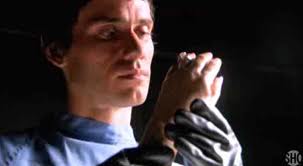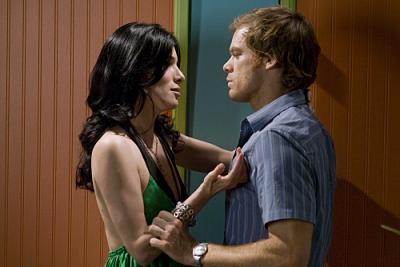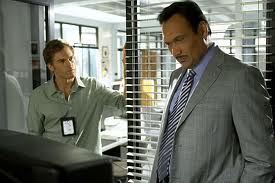Dexter Season 6
Dexter season six premieres on Sunday, October 2 on Showtime. Once again, we will get the opportunity to watch some strong dramatic writing at work. Dexter has always been a good example of the use of a dynamic character and the technique of dramatic inevitability. Both devices contribute to dramatic character and plot arcs over the course of a season.
But even before we experienced a full season of the show, we were drawn in by that Big Idea:
 A serial killer who hunts serial killers.
A serial killer who hunts serial killers.
The concept for Dexter took a popular, commercially proven genre (the serial killer procedural) and gave it a fresh hook that flowed from character and inherently generated high-stakes story engines. This is practically the definition of High Concept. Way to go, Dexter creators!
THE DYNAMIC CHARACTER
Each season of the show introduces a key supporting character that will generate escalating conflict for Dexter Morgan. I like to call them the Dynamic Character.
In the pilot episode of Dexter, we find out that blood-spatter specialist Dexter Morgan can’t feel normal human emotions, which has led him to engineer a carefully controlled life for himself in which he must fake being a sympathetic person to hide his past and his true identity as a serial killer. But he’s not a textbook serial killer who preys on the weak. He only murders the wicked in adherence with a code of justice that was instilled in him by his father, who was the only person who ever knew about Dexter’s “dark passenger” (his inner bloodlust and lack of pathos).
Considering those character elements, what needs to happen in this first season? He must be forced to feel true emotion. On the internal line of action, this happens as he grows closer to his girlfriend, Rita, which is a frightening proposition for a man that leads a double life and has never learned how to love. But the true Dynamic Character in the first season of Dexter is the villain, the “Ice Truck Killer.”
Dexter slowly realizes that the Ice Truck Killer’s crime scenes are patterned after events from his childhood, thus the Central Dramatic Question becomes: How does the Ice Truck Killer know so much about Dexter? The shocking answer arrives toward the end of the season: the Ice Truck Killer is Dexter’s brother. Why didn’t his father tell him he had a brother? To make matters worse, Dexter’s sister Debra has fallen in love with the Killer! If Dexter takes him out, he’s killing his brother, risking the exposure of his true identity and crimes, and robbing his sister of the only true love she’s ever known. Now that’s some high stakes, people.
In Season Two of Dexter, there’s an incredible amount of conflict piling on top of Dexter Morgan, most notably that HE’s the killer-at-large this time, the so-called “Bay Harbor Butcher” that’s being stalked by his sister Debra and his colleagues in their police unit. But the writers knew they had to up the ante and throw in a character who finds out Dexter’s secret, so they created the dynamic character of LILA, played by Jaime Murray. Love her or hate her, she mined some terrific conflict and put Dexter into many a corner, threatening the facade that he had so carefully cultivated with his job, sister and his girlfriend, Rita.
Lila was also a wackadoodle who showed her boobs a lot. (Shocking for a premium cable show, right?)
In Season Three of Dexter, the dynamic character is D.A. MIGUEL PRADO, played by Jimmy Smits. Last season, we’d already seen Lila (and Sergeant Doakes, btw) discover Dexter’s secret, so, to push it one step further, Prado not only learns of Dexter’s night-time activities, but he blackmails him to become his partner in crime! Thus, Dexter reluctantly takes on a protege, a Robin to his Batman, if you will. But Prado becomes a bit too eager in his killing practices and quickly becomes a dangerous liability, thus the stakes escalate to yet another nail-biting season finale.
Dexter Season Four finds good ol’ Dex infiltrating the life of the “Trinity Killer,” played chillingly by John Lithgow.
As his Miami Homicide unit struggles to identify Trinity, Dexter Morgan has already found him, assumed a false identity and infiltrated Trinity’s church group and home. The inevitable happens: Trinity learns Dexter’s true identity, making it a question of who will kill who first? In the end, Dexter dispatches Trinity but not before coming home to Trinity’s final murder: Dexter’s wife, Rita. The writers include a poetic callback to a baby Dexter being found near his mother’s dead body, crying on a floor covered in blood, when Dexter finds his baby (did I mention he had a son somewhere in this gory saga?) in the same position, crying next to Rita’s corpse floating in a tub of bloody water. Dexter’s haunted life has come full circle.
But wait, there’s more! This is television, after all, we must…keep…going. In season five, Dexter is once again tracking an evil killer, a charismatic motivational speaker played by Johnny Lee Miller, but the dynamic character comes in the form of one of his victims who craves revenge: LUMEN, played by Julia Stiles.
After four seasons of generating every possible close-call for Dexter, the writers found a new engine: Dexter helps a victim get revenge on her attackers. Will his sympathy for her and her lack of experience threaten his killing code and expose his dark passenger to the world? To make matters worse, he’s hunting his first target who is a public figure, so the risk is even higher.
There are many other devices and supporting characters in the intricately plotted Dexter scripts, but to discuss them all would be the stuff of a much longer analysis. If you can handle blood and don’t mind the occasional over-the-top scene, I encourage you to enjoy the show as a fun, compelling modern pulp thriller series that shows off some terrific screenwriting.
That brings us to Season Six. I’m eager to see what the writers have cooked up this time, and I’ve avoided clips and reviews so I can be surprised on Sunday night. If you watch the show, please sound off in the comments below but no spoilers.
Good luck and happy human hunting,
Dan Calvisi
“There is a lot of great advice here…
Most important, as I read Calvisi’s Story Maps,
I was inspired to rethink my current project.
And that’s what it’s all about, right?”
-Script Magazine








Good analysis of the central conflicts of each season. I think “Dexter” seasons 1, 2, and 4 are superb, but it seems to me the show’s missing a great conflict engine that the original novelist, Jeff Lindsay, has already been using for two books: in the books, Deb, Dex’s sister, *knows* his true secret. It defies plausibility that *no one* in a professional Homicide department knows about Dexter (which was what was so great about Doakes and his suspicions.) How aweomse would it be if Deb had to navigate the pitfalls of having a brother as a sociopath? She’d never turn him in, because he kills serial killers, but it’d lead to some tremendous conflict.
Shows thrive and prosper when they change the game, and relationships, by bringing ‘civilians’ to the lead character’s secret (think of the great moment in Buffy season 2, when Joyce watches Buffy stake a vampire right in front of their home.) Another point of comparison: by the end of season 2 of “Chuck,” ‘civilians’ Morgan and Awesome knew all about Chuck’s secret, and by the end of season 3 of “Breaking Bad,” former ‘civilian’ Skyler is actively helping Walter White launder his drug money. I feel like Dexter’s insistence that no one inconvenient ever find out about his activities is, at this point, actively hurting the show.